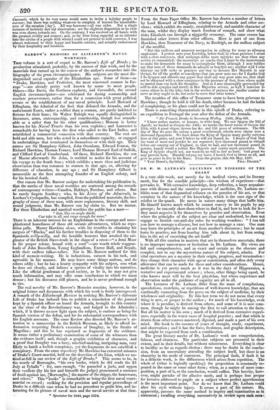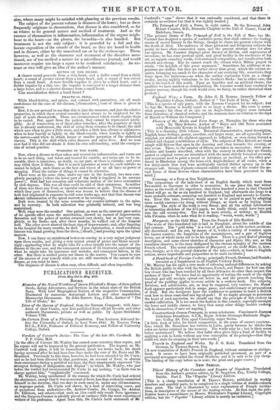DR. M. LATHAM'S LECTURES ON DISEASES OF THE HEART
Is a very able work, not merely for its medical views, and its literary merit, but for the sensible principle—the wisdom of experience—that pervades it. With extensive knowledge, deep reflection, a large acquaint- ance with disease and the curative powers of medicine, Dr. Latham ex- hibits none of that dogmatical reliance on the practice of his art, or that certainty in the nature of his knowledge, which is the sure sign of the sciolist or the quack. He meets in nature many things that baffle him. He himself knows much which he cannot convey to his pupils by any precept; he can only show them where to find it, and how to look for it— they must acquire it for themselves by practice and observation. Even where the principles of the subject are clear and undoubted, he does not engage to furnish cut-and-dry rules for working wonders : "I can tell you how to manage a disease, but not how to manage a case. One man may learn the principles of an art from another's discourse ; but he must learn its practice, not from hearing him talk about it, but from seeing him in the act of exercising the art itself?'
With all this caution in matters that are in themselves uncertain, there is no improper narrowness or hesitation in Dr. Latham. His views are full and comprehensive, and as exact and certain as the obscure and complex, not to say the mysterious nature of his subject, admits. For vital operations are a mystery in their origin, progress, and termination : they change their character with age or constitution, and often defy every allowance that can be made for these and other considerations. Hence, medicine is yet pretty much as it was in the days of Hippocrates, a tentative and experimental science ; where, other things being equal, he who knows most will be the best physician, but where experience and observation under the guidance of sagacity are all in all.
The Lectures of Dr. Latham differ from the mass of compilations, speculations, crotchets, or repetitions of well-known knowledge, that are continually emanating from the press on the subject of medicine, by their wholeness and originality. By this last term we do not mean that every thing is new, or proper to the author ; for much of his knowledge, even where it is peculiar, is derived from others, and some of it is now com- mon, though he might be among the first to call attention to the facts. But all his matter is his own ; much of it derived from extensive experi- ence, especially in the worst cases of hospital practice ; and that which is drawn from other sources mastered, digested, and made a part of his own mind. His book is the essence of years of thought, study, experiment, and observation ; and it has the force, freshness, and graphic description, that might be expected from such a combination.
The great literary merits of Dr. Latham's work are comprehension, fulness, and clearness. The particular subjects are presented in their extent, and in their details, but without minuteness. Everything is clear to lucidity so far as regards diction : there may be doubt in the conclu- sion from an uncertainty attending the subject itself, but there is no obscurity in the mode of statement. The principal fault, if fault it be in a didactic work, is the diffuseness which arises from repetition. The whole of (what is logically speaking) the proposition is constantly re- peated in the same or some other form; when, as a matter of mere com- position, a part of it, or the conclusion, would suffice. This brevity, how- ever, might par take of the allusive mode, and is perhaps less proper for lectures addressed to pupils on a subject where perfect apprehension is the most important point. Nor do we know that Dr. Latham could alter his style without injury. It seems a part of his nature. He, apparently, pursues the same method in inquiry and examination as in statement ; recalling everything successively in review upon each occa•
lion, where many might be satisfied with glancing at the previous results. The subject of the present volume is diseases of the heart ; but as these frequently originate in rheumatism, that disease is also considered, so far as relates to its general nature and method of treatment. And as the essence of rheumatism is inflammation, inflammation of the organs neigh- bour to the heart—as the pleura, the bronchia—is also handled. But treatment is not the only subject : ills preceded by a full and ela- borate exposition of the sounds of the heart, as they are heard in health and in disease, either by the unassisted ear or by the stethoscope. These, however, as well as the character and treatment of the disorders men- tioned, are of too medical a nature for a miscellaneous journal, and would moreover require too large a space to be rendered satisfactory. An ex- tract or two will give an idea of the author's manner.
SOUNDS OF THE HEART.
A clearer sound proceeds from a thin heart, and a duller sound from a thick heart; a sound of greater extent from a largo heart, and a sound of less extent from a small heart. A more forcible impulse is given by a thick heart, and a feebler impulse by a thin one; the impulse is conveyed to a longer distance from a large heart, and to a shorter distance from a small heart.
Can auscultation detect a hard heart ?
PRACTICAL SKILL.
While blood-letting, and opium, and calomel with purgatives, are all made confederate for the cure of the disease, [rheumatism,] none of them is given in excess.
Now, do not pretend to say that this is just the measure and just the relative
proportion, '
on, in which these several remedies need always to be employed for the cure of acute rheumatisr6. There are circumstances which would require them to be varied. But, apart from the patient, they cannot be represented intelli- gibly. As of venesection, so of these other remedies, after the propriety of their i
use s already understood, the skill of using them remains to be learnt; the skill which sees when to give a little more, and when a little less, oftener or seldomer- when to bear heavily or lightly on the blood-vessels, when heavily or lightly on the nerves—and when to obtain larger or smaller purgation of the abdominal viscera. This is the skill which cures diseases and saves lives. And no man ever had it who did not obtain it from his own self-teaching, amid the emergen- cies of actual practice.
WORKING IN THE DARK.
Now, when a disease is thus taken and treated for inflammation, and turns out to be no such thing, and taken and treated for curable, and turns out to be in- curable, there is ignorance, no doubt, on our part, or there is mistake, and some may think there is blame. But it is such ignorance as must be, such mistake as cannot be helped, such blame as the best and wisest of us all have no power of escaping. From the nature of things it cannot be otherwise. There were at the same time, under my care in the hospital, two men com- pletely paraplegic [where the lower part of the body is impaired in its nervous power]. Both had lost sensation and voluntary motion of the lower extremities
slow degrees. This was all that could be.said of their symptoms. In neither them was there any fever, or vascular excitement, or loin. From the account which they gave of themselves, there was reason to believe that the disease of both had originated in exposure to cold some weeks ago, and that that disease was chronic inflammation of the spinal marrow or its coverings.
Both were treated by the same remedies—by counter-irritants to the spine, and by mercury. In both salivation was gradually induced, and was long maintained.
Well, what were the results? One patient, as soon as the mercury gave notice of its specific effect upon the constitution, showed an earnest of improvement. Sensation and the power of motion returned very slowly, but at last very com- pletely, to his limbs; and, after three months, he walked out of the hospital well. The other never showed the least sign of improvement; and, after lingering in the hospital for many months he died. Upon examination, a small scrofulous tumour was found growing from the theca, [sheath,] and pressing upon the spinal
IDOSTOW.
Now, I can fancy an uninformed looker-on coming to a very unjust judgment upon these results, and giving a very unjust award of praise and blame accord- ingly; applauding what he might take for a clear insight into the nature of the disease in the one case, and the consequent success of its treatment, and censuring what he might take for ignorance and mistake, and consequent failure, in the other. But there is neither praise nor blame in the matter. You cannot be sure of the success of your remedy while you are still uncertain of the nature of the disease, as you must be here. The diagnosis of disease is often easy, often difficult, and often impossible.



























 Previous page
Previous page